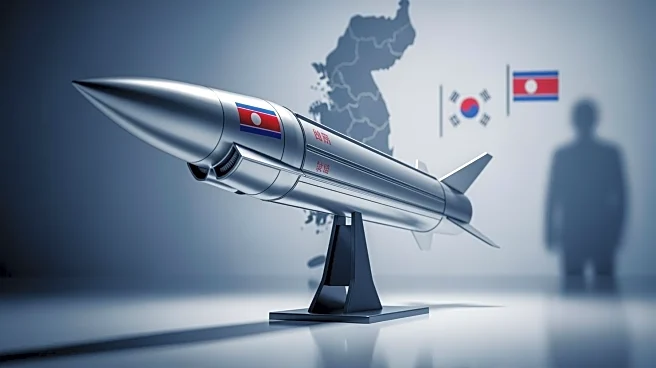What's Happening?
North Korea has conducted its first ballistic missile tests in five months, launching multiple short-range ballistic missiles from an area south of Pyongyang. These missiles traveled approximately 217
miles in a northeastern direction. The tests come just days before President Donald Trump is scheduled to visit South Korea for a regional summit. South Korea's military, in coordination with the United States, is maintaining readiness to respond to any provocations. Japan's Prime Minister Sanae Takaichi confirmed that the missiles did not reach Japan's territorial waters, and there were no reports of damage. The missile tests are seen as a strategic move by North Korea to assert its position as a nuclear weapons state, a status that North Korean leader Kim Jong Un seeks to leverage for the lifting of economic sanctions.
Why It's Important?
The missile tests by North Korea are significant as they occur in the context of President Trump's upcoming visit to South Korea, where he is expected to engage in bilateral meetings with leaders, including Chinese President Xi Jinping and South Korean President Lee Jae Myung. The tests underscore North Korea's ongoing efforts to gain international recognition as a nuclear power, which could have implications for regional security and diplomatic relations. The timing of the tests suggests a potential attempt by North Korea to influence discussions at the Asia-Pacific Economic Cooperation summit, where economic integration and trade are the primary focus. The tests also highlight the challenges faced by the international community in addressing North Korea's nuclear ambitions and the potential for renewed diplomatic engagements.
What's Next?
As President Trump prepares for his visit to South Korea, the international community will be closely monitoring North Korea's actions. The potential for further missile tests or other provocations remains, particularly during the APEC summit. Diplomatic efforts may be influenced by these developments, with stakeholders such as the United States, South Korea, and Japan likely to engage in discussions on how to address North Korea's nuclear program. The possibility of renewed talks between the U.S. and North Korea could arise if conditions are deemed favorable, particularly if North Korea signals a willingness to negotiate on its nuclear status.
Beyond the Headlines
The missile tests by North Korea highlight the ongoing geopolitical tensions in the region and the complex dynamics of international diplomacy. The tests serve as a reminder of the challenges in achieving denuclearization on the Korean Peninsula and the broader implications for global security. The situation also raises questions about the effectiveness of economic sanctions as a tool for influencing North Korea's behavior and the potential need for alternative diplomatic strategies. The role of China and Russia, as key players in the region, will also be critical in shaping the future of North Korea's nuclear ambitions.









